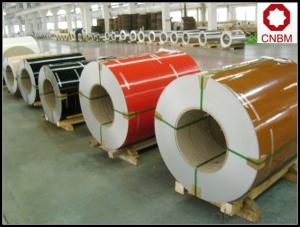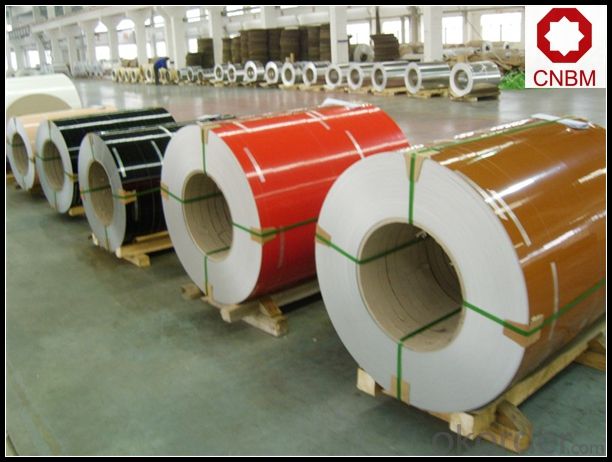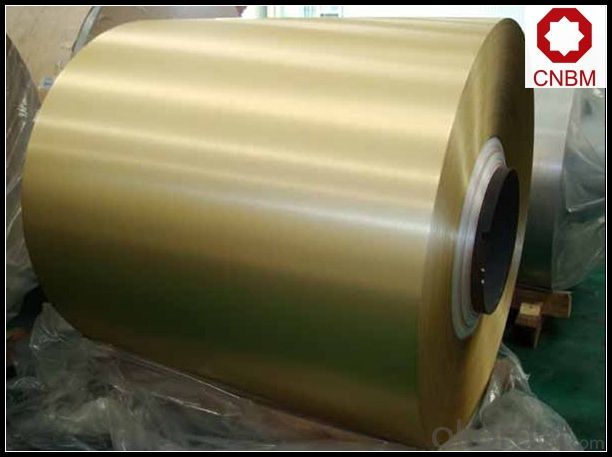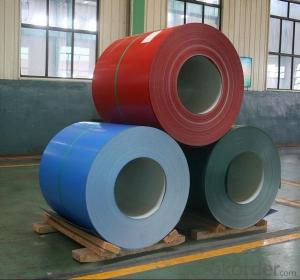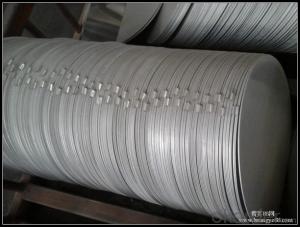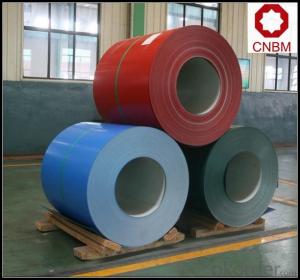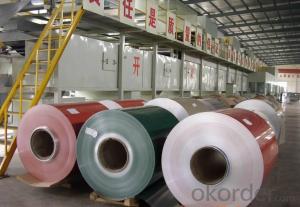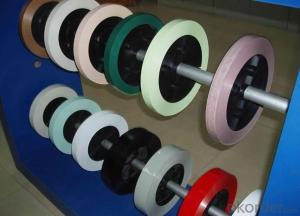6061 Aluminum Coil Manufacture Gutter Roof Aluminum Composite Panel 1100 3003 PE PVDF Coated
- Loading Port:
- Shanghai
- Payment Terms:
- TT OR LC
- Min Order Qty:
- 5 m.t.
- Supply Capability:
- 10000 m.t./month
OKorder Service Pledge
OKorder Financial Service
You Might Also Like
Specification
1. Specification of Gutter Roof Aluminum Composite Panel 1100 3003 PE PVDF Coated
Thickness | 0.1mm-10mm |
Popular Thickness | 0.1mm/0.2mm/0.25mm/0.3mm/0.6mm/0.8mm/1.0mm/1.2mm/1.5mm/2.0mm/3.0mm... |
Width | 20mm-2500mm |
inner diameter | 505mm 508mm 605mm |
Material | 1050,1060,1070,1100,1200,3003,3004,3005,5052,5005,5754,5083 |
Temper | O,H12,H14,H16,H18,H22,H24,H26,H32,H34,H36,H38,H111,H112 |
Surface | mill finish |
Packing | Export standard wooden pallets |
Payment Terms | 100% irrevocable L/C at sight or 30% T/T in advance as deposit,70% balance against the B/L copy |
Minimum Order Quantity | 5000kg |
Delivery time | 15-25 days after receiving L/C or deposit |
Remark | Specific requirement of alloy grade, temper or specification can be discussed at your request |
2. Application of Gutter Roof Aluminum Composite Panel 1100 3003 PE PVDF Coated
(1).Interior: wall cladding, ceilings, bathrooms, kitchens and balconies, shutters, doors...
(2).Exterior: wall cladding, facades, roofing, canopies, tunnels,column covers , renovations...
(3).Advertisement: display platforms, signboards, fascia, shop fronts...
3. Feature of Gutter Roof Aluminum Composite Panel 1100 3003 PE PVDF Coated
*Such coil is specially designed to replace aluminum ingot, due to the high export tax of aluminum ingot, the coil has better price than ingot.
*This type of coil can fit customer's remelting furnace just like ingot, no need to make any change to the production line that was previously used for ingot. The standard coil size and weight is very suitable for the feed gate of furnace.
*This type of coil causes less material wastage than ingot when remelted.
*Our coil is made directly from ore, no need to go though the ingot making process, quality is much better than other suppliers who use ingot scrap to make coil.
Be free from Oil Stain, Dent, Inclusion, Scratches, Stain, Oxide Dicoloration, Breaks, Corrosion, Roll Marks, Dirt Streaks and other defect which will interfere with use
4. Certificate:
SGS and ROHS(if client request, paid by client), MTC(plant provided), Certificate of Origin(FORM A, FORM E, CO), Bureau Veritas and SGS (if client request, paid by client), CIQS certificate
5. Image of Gutter Roof Aluminum Composite Panel 1100 3003 PE PVDF Coated
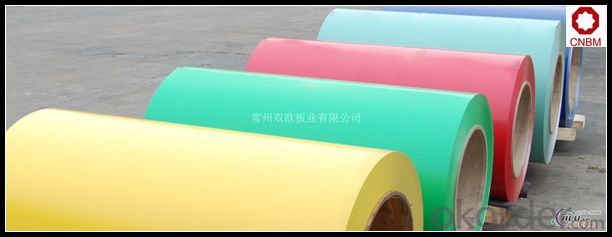
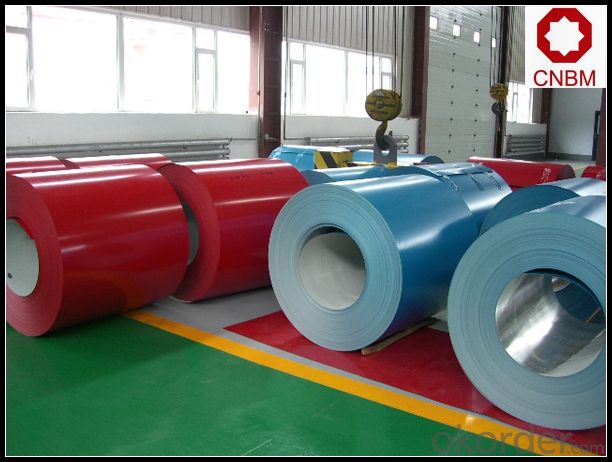
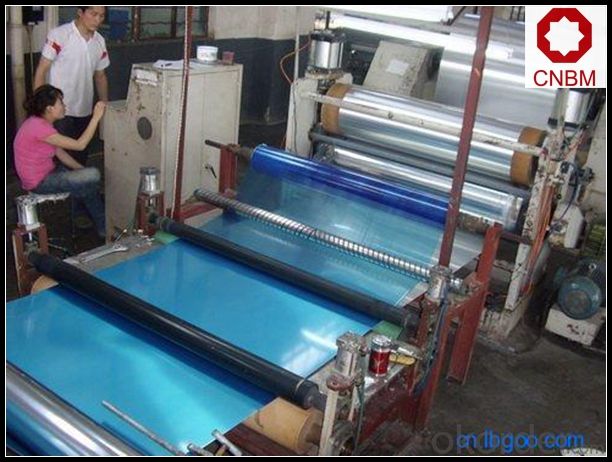
6. Package and shipping of Gutter Roof Aluminum Composite Panel 1100 3003 PE PVDF Coated
eye to wall
eye to the wall
with wood pallet (wooded case also available)
7. FAQ
1) What is the delivery time?
Dpends on actual order, around 20 to 35 days
2)What is the QC system:
We have QC staff of 20 persons and advanced equipment, each production is with MTC traced from Aluminum ingot lot.
3) What market do you mainly sell to?
Australia, America, Asia, Middle East, Western Europe, Africa etc
- Q: What are the different alloy grades used in aluminum coils?
- There are several different alloy grades commonly used in aluminum coils, including 3003, 5052, 6061, and 7075. These grades have varying levels of strength, corrosion resistance, and weldability, making them suitable for different applications in industries such as automotive, construction, and aerospace.
- Q: Can aluminum coils be used in the production of aluminum siding?
- Yes, aluminum coils can be used in the production of aluminum siding. Aluminum coils are commonly used in the manufacturing process of aluminum siding due to their durability, lightweight nature, and resistance to corrosion. These coils are usually processed through a coil coating line, where the aluminum is coated with a protective layer to enhance its performance and aesthetics. The coated aluminum coils are then formed and shaped into the desired siding panels, which can be installed on residential or commercial buildings. Aluminum siding is a popular choice for its low maintenance requirements, longevity, and ability to withstand various weather conditions.
- Q: Can aluminum coils be used for aerospace applications?
- Yes, aluminum coils can be used for aerospace applications. Aluminum is widely used in the aerospace industry due to its lightweight, high strength-to-weight ratio, corrosion resistance, and excellent conductivity. Aluminum coils are commonly used in various aircraft components such as structural frames, fuselage panels, and wing structures.
- Q: What are aluminum coils?
- Aluminum coils are long, flat strips of aluminum that have been rolled up into a cylindrical shape. They are commonly used in various industries, including automotive, construction, and HVAC, for their excellent heat conductivity and corrosion resistance properties. These coils can be further processed and fabricated into different products such as roofing materials, heat exchangers, and electrical wiring.
- Q: What maintenance is required for aluminum coils?
- Maintenance for aluminum coils typically includes regular cleaning and inspection to ensure efficient performance and longevity. Here are some specific maintenance requirements for aluminum coils: 1. Cleaning: Regularly clean the aluminum coils to remove dirt, dust, and debris that can accumulate on the surface. Use a soft brush or a vacuum cleaner with a brush attachment to gently remove any loose particles. Avoid using abrasive cleaners or brushes that can scratch or damage the surface of the aluminum. 2. Inspection: Periodically inspect the aluminum coils for signs of damage or wear. Check for any bent or dented fins, which can restrict airflow and reduce the coils' efficiency. Look for signs of corrosion, such as discoloration or pitting, as this can affect the coils' performance and lifespan. 3. Coil Protection: Apply a protective coating or sealant to the aluminum coils to prevent corrosion and damage from exposure to moisture, chemicals, or harsh environmental conditions. This can help prolong the life of the coils and maintain their performance. 4. Lubrication: If your aluminum coils are part of a mechanical system, such as an HVAC unit, ensure that any moving parts are properly lubricated. This can help reduce friction and wear on the coils, improving their efficiency and preventing premature failure. 5. Professional Maintenance: Consider scheduling regular professional maintenance for your aluminum coils, especially if they are part of a larger system. HVAC technicians or specialized coil cleaning services can provide a thorough inspection, cleaning, and maintenance to ensure optimal performance and identify any potential issues early on. By following these maintenance practices, you can help extend the lifespan of your aluminum coils, improve their efficiency, and prevent costly repairs or replacements.
- Q: I would like to know because I'm getting a sword with an aluminum sheathe.
- That would depend on The Alloy and the Condition The alloy is the elements in percent that make up that material. The Condition is the heat treat of that alloy. Reffered to as Treatment when it comes to Aluminum Examples: 2024 T4 6061 T6 6063 T6 7075 T7 Etc,etc,etc,etc.................... Saying the word Aluminum is like saying the word Wood (Which One?) Aluminum can range from..what is this stuff,so soft and bends so easy To what the hell is this stuff, so dam hard stiff,and it just won't bend!! Oh,and 30 year boy........sit down.......30 years,and that is all you could come up with!!!! 30 years of drinking coffee,joking with the boss,and goofing off.You may want to sit the beer down and read up on the material you have been working with for 30 Years!!!!!
- Q: What are the different types of surface treatments for corrosion resistance?
- Various materials can benefit from different surface treatments to enhance their resistance to corrosion. These treatments can be grouped into mechanical, chemical, and electrochemical methods. 1. To improve corrosion resistance, mechanical surface treatments involve physically altering or modifying the material's surface. Shot peening, sandblasting, and polishing are common methods. Shot peening induces compressive stresses by bombarding the material with small metal pellets, preventing corrosion. Sandblasting removes existing corrosion and creates a clean, smooth surface by blasting it with abrasive particles. Polishing, using abrasives, creates a smooth, reflective surface that reduces the chances of corrosion initiation. 2. Chemical surface treatments involve applying a chemical solution or coating to create a protective layer against corrosion. Chromating, for example, applies a chromate conversion coating that acts as a barrier against corrosion and improves adhesion for subsequent paint or coating layers. Anodizing, commonly used for aluminum surfaces, creates a thick oxide layer that enhances corrosion resistance and can provide decorative finishes. Other chemical treatments, like phosphating, passivation, and galvanizing, use specific chemical solutions or coatings to protect against corrosion. 3. Electrochemical surface treatments utilize electrochemistry principles to create a protective layer. Electroplating involves depositing a thin layer of a more corrosion-resistant material, such as zinc, nickel, or chromium, onto the base material's surface. Anodic protection connects a sacrificial anode to the material, causing the anode to corrode instead of the material itself. This method is commonly used for underground structures and pipelines. The choice of surface treatment for corrosion resistance depends on factors like the material, intended application, and desired level of protection. It is crucial to consider factors like cost, environmental impact, and performance requirements when selecting the appropriate treatment, as each method has its advantages and limitations.
- Q: Normal aluminum like you find in the ground, not the man made stuff
- If you heat it up hot enough, yes. Of course, any atomic matter will also behave that way.
- Q: Can aluminum coils be used in the production of aluminum sunshades?
- Aluminum sunshades can indeed incorporate aluminum coils. In the manufacturing process of these sunshades, aluminum coils serve as the initial material. These coils are crafted from top-notch aluminum, renowned for its lightweight and resilient properties. They are subsequently formed and molded into the desired shape for the sunshade, whether it is slats, louvers, or a solid panel. The corrosion resistance and ability to withstand diverse weather conditions are among the reasons why aluminum is a favored choice for sunshades. It is worth noting that aluminum is easily recyclable, rendering it an environmentally friendly material for sunshade production. All in all, aluminum coils are indispensable elements in the creation of aluminum sunshades, contributing to their strength, durability, and aesthetic allure.
- Q: What are the potential applications of pre-painted aluminum coils?
- Pre-painted aluminum coils have a wide range of potential applications due to their versatility and durability. One potential application is in the construction industry, where pre-painted aluminum coils can be used for roofing and cladding. The pre-painted coating provides an attractive and protective finish, making it ideal for both residential and commercial buildings. Additionally, aluminum is lightweight, which makes it easier to install and transport. Another potential application is in the manufacturing of appliances and electronics. Pre-painted aluminum coils can be used to create outer casings for various appliances, such as refrigerators, ovens, and air conditioners. The coating provides a smooth and aesthetically pleasing finish, while the aluminum itself offers excellent heat dissipation properties. Pre-painted aluminum coils also find applications in the automotive industry. The durable coating helps protect the surface of the vehicle from scratches, UV rays, and corrosion. Additionally, aluminum is lightweight, which can contribute to fuel efficiency and improved performance. In the signage industry, pre-painted aluminum coils are commonly used for outdoor and indoor signage. The coating provides a long-lasting and vibrant finish, making it suitable for a variety of signage applications, such as billboards, store signs, and traffic signs. Furthermore, pre-painted aluminum coils can be employed in the manufacturing of furniture and fixtures. The coating adds a decorative touch to furniture pieces, while the aluminum provides strength and stability. This makes pre-painted aluminum coils suitable for items such as cabinets, shelves, and decorative panels. Overall, the potential applications of pre-painted aluminum coils are vast and diverse. Their versatility, durability, and attractive finish make them suitable for various industries, including construction, manufacturing, automotive, signage, and furniture.
Send your message to us
6061 Aluminum Coil Manufacture Gutter Roof Aluminum Composite Panel 1100 3003 PE PVDF Coated
- Loading Port:
- Shanghai
- Payment Terms:
- TT OR LC
- Min Order Qty:
- 5 m.t.
- Supply Capability:
- 10000 m.t./month
OKorder Service Pledge
OKorder Financial Service
Similar products
Hot products
Hot Searches
Related keywords
